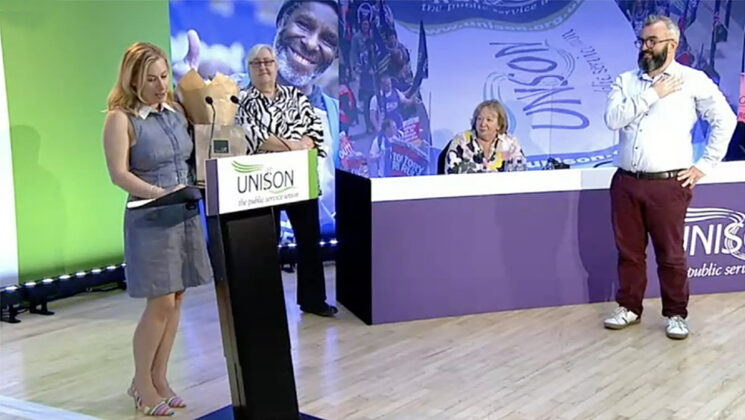When the pandemic is finally over, workplaces need to be made a lot more fair for the people who have helped the country through the crisis, UNISON delegates heard today.
Lilian Macer opened a debate on a composite motion made up of submissions from her own Scotland region and the Newcastle Hospitals branch, each addressing the need to create fairer workplaces.
She said that it was UNISON members who had kept communities safe “in the eye of the COVID storm”.
And yet the crisis of the last 15 months had shown more clearly than ever the unfairness that exists for so many of those workers.
For instance, according to the TUC two million workers in the UK aren’t eligible for sick pay, a situation exacerbated by “austerity, underfunding of public services and work insecurity.”
Fair work conditions can be a fundamental driver for improving the lives of individuals and their communities, Ms Macer said.
“Never has there been more need for a fair work agenda… Workers want to be treated with dignity and respect.”
And she concluded: “Let’s make sure that no worker has to choose between keeping the public safe or feeding their family.”
Miriam Mafemba for Newcastle Hospitals told delegates that, “COVID has tested each and every one of us to our very limits.”
While talking of the trauma of what NHS workers had experienced, she also praised other key workers, such as the bus drivers who had made sure that she, as a nurse, could get to work during the pandemic.
Roberta Magee from South East Belfast Health branch said that, “too often our workers are exploited, undervalued and underpaid.
“When workers in their care homes struggle to get access to sick pay in a pandemic, it shows how bad things are.”
Among a lengthy list of actions, conference called on the union to:
- campaign to protect hard-won employment protections;
- continue to campaign on employment protections and enhancing worker and trade union rights, regardless of the outcome of any Conservative employment bill;
- support service groups and branches to bargain for employment protections that will improve working life for members and potential members;
- continue to campaign for further action to narrow the gender pay gap, to promote the use of UNISON’s Bridge the Gap materials and to call for mandatory reporting of ethnicity and disability pay gaps, along with robust and enforceable action plans to tackle the causes of all pay gaps.
Fighting attacks on employment rights
Moving a motion on organising to defend workers’ rights after Brexit and COVID, Rad Kerrigan from the Eastern region reminded delegates that, last year, news came out that the business secretary was drawing up plans to weaken employment rights.
“There’s nothing the Tories love more than a poor person, because poor people make rich people richer”.
UNISON should particularly lead the fight to end fire and rehire, which is already illegal in Ireland, France and Spain, he continued.
For the NEC, Tracey Wainwright observed that, “health and safety has literally been a matter of life and death” in the past year. But of assurances from the Westminster government that it is not seeking to water down employment rights and protections, she said that the promises of a Tory government were “as inadequate as the PPE” it arranged in the pandemic.
Health and safety also came up in motion 20, learning the lessons from the pandemic for safer workplaces. Jan Tomlinson from Cymru/Wales told delegates that health and safety had long been derided as “red tape”, but the pandemic had brought into sharper focus than ever just how essential it was.
Praising the union, she said that “UNISON stepped into the void” and “shouted from the rooftops” as issues came up.
Vice president Sian Stockham, speaking for the NEC, said that UNISON members “deserve to go to work knowing that they are safe and treated with respect”. The UK government’s attitude was a “moral outrage.”
Among a raft of actions for the motion, delegates called on the NEC to campaign for:
- strengthening of the regulatory structures to ensure that employers do more to keep workers safe through regular inspections and strong enforcement;
- action to highlight the hazards of home working and for measures to support those working in this way;
- the need to have proper, negotiated home working and agile working policies in workplaces; and
- highlight the failures of this government in tackling the COVID-19 pandemic and ensure systems are in place to strengthen the response to this and any future pandemics.
A final motion on organising to end the crisis in social care saw Sharon Nicoll from Knowsley observe that, in his first speech as prime minister, Boris Johnson had promised to fix social care – a promise that to date had not produced any changes or proposals.
Delegates called on the NEC to:
- work with service groups, Labour Link and other stakeholders to campaign for a social care system that is publicly delivered, free at the point of need and paid for by universal progressive taxation;
- work with the same groups to demand the requisite resources to properly resource a national social care organising campaign;
- work with the same groups to lobby political parties in positions of power and influence in Scotland, Cymru/Wales and Northern Ireland, to continue to highlight the gross under-funding of adult social care and the impact this has on society.
The curtain came down on the special delegate conference as president Josie Bird was given the traditional – albeit virtual – thanks at the end of her presidency.

